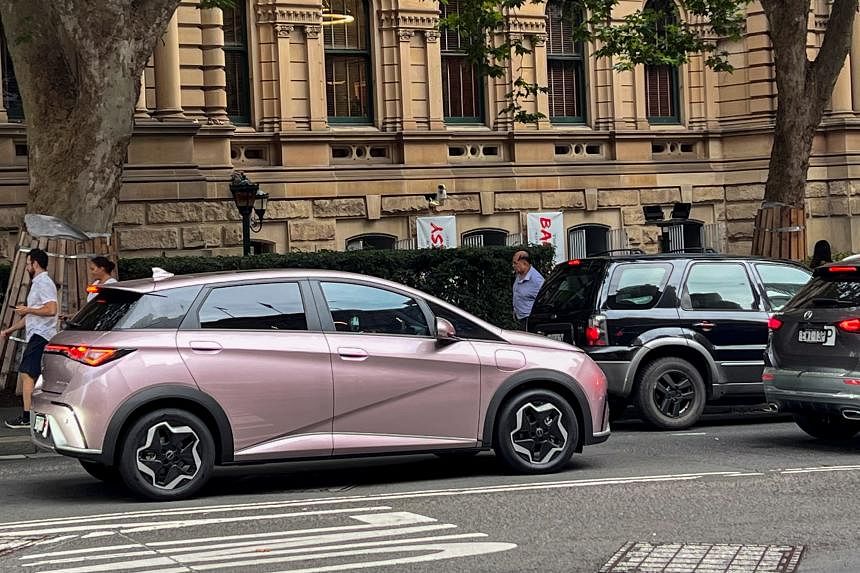JAKARTA – As American carmaker Tesla and China’s BYD Automobile compete neck and neck in most parts of the world, the Shenzhen-headquartered company is now in pole position when it comes to the electric vehicle (EV) race in Indonesia.
In January, the Chinese EV maker started utilising a government tax break to ship three of its models – Dolphin, Atto 3 and Seal – to Indonesia, South-east Asia’s largest economy, which boasts a population of 280 million.
In April, BYD will set up its first assembly plant in West Java province – in a 108ha plot of land strategically located near the new Kertajati airport and Patimban seaport, a person with knowledge of the plan told The Straits Times.
According to checks by ST, the area could be in the district of Subang, where basic infrastructure is relatively more developed and where the 2,700ha Smartpolitan industrial estate is being built by a private company.
The Indonesian government has said that the Chinese EV maker will invest US$1.3 billion (S$1.75 billion) to build the manufacturing facility, which has the capacity to produce 150,000 vehicles a year.
When contacted by ST, Mr Nathan Sun, director of operations at BYD Indonesia, declined to comment and said he is not authorised to speak on this matter.
The Indonesian government is dangling waivers of 50 per cent off import tariffs and another 15 per cent off the luxury goods tax – which applies to vehicles – in front of EV makers, from 2024 until the end of 2025.
To qualify for these exemptions, foreign EV makers must commit to producing the same number of vehicles locally between January 2026 and December 2027 as what they import from 2024 till end-2025.
A senior government official who helped to design the tax incentive told ST that before BYD entered the market, Tesla had tried to ask for these incentives.
However, the American carmaker was unable to guarantee that it would manufacture vehicles locally.
The Indonesian government requires EV makers to place guarantee funds at local banks that match the tax incentive value of the planned EV imports, and will release the funds once the EV makers complete the local production target.
“Tesla asked for tax waivers and said they wanted to test the market first, but unfortunately, we cannot grant their wish as it would be unfair to the other guys,” said the government official, who spoke on condition of anonymity.
Former automotive journalist Ermiel Zulfikar said there is little chance for Tesla to establish a significant presence in Indonesia, let alone compete with BYD, because it cannot make use of the available tax waivers and has higher manufacturing prices.
“The Tesla cars we see on the road here were shipped by independent importers, and the consumers’ price tags were insane. Plus, there is no after-sales service for Tesla,” Mr Ermiel told ST, pointing out that several other EV makers from South Korea and China have already entered the Indonesian market and set up networks of dealerships and service stations.
In 2022, South Korea’s Hyundai started to make its EV Ioniq 5 in Cikarang, West Java. That same year, China’s Wuling Air EV also began production in the same district.
China’s MG4 EVs hit Indonesian roads in January at very competitive prices.
China’s Neta V and Chery Omoda E5 EVs are also available in the Indonesian market.
The number of new-energy cars in Indonesia grew by 43 per cent to 12,248 as at end-2023, compared with 8,562 in 2022, according to industry ministry data.
Non-battery cars, or internal combustion engine cars, number above 17 million.
Speaking about the US-China trade war and rising unemployment in China during a conference in Singapore on March 27, former Indonesian trade minister Muhammad Lutfi said countries worldwide, including Indonesia, have felt the impact.
“Unemployment in China is an international problem because they still have to produce and dump their goods somewhere,” Mr Lutfi said at the Indonesia-Singapore Business Forum at Hilton Singapore Orchard.
The US-China trade war has hurt China’s exports, putting pressure on Chinese manufacturers to lower the prices of cars to secure sales in other markets.
Mr Lufti said the prices of EVs are dropping at an average of five million rupiah (S$420) a week, noting that the five-seater hatchback MG4 EV was sold at 500 million rupiah at its launch in Indonesia in January, but is now priced at slightly above 400 million rupiah.
Meanwhile, BYD’s Dolphin enters the market at a competitive price of around 400 million rupiah, said Mr Ermiel.
And BYD’s most expensive model available in Indonesia, the Seal, is offered at about 625 million rupiah, while Tesla’s cheapest Model 3 car is priced at 1.5 billion rupiah.


